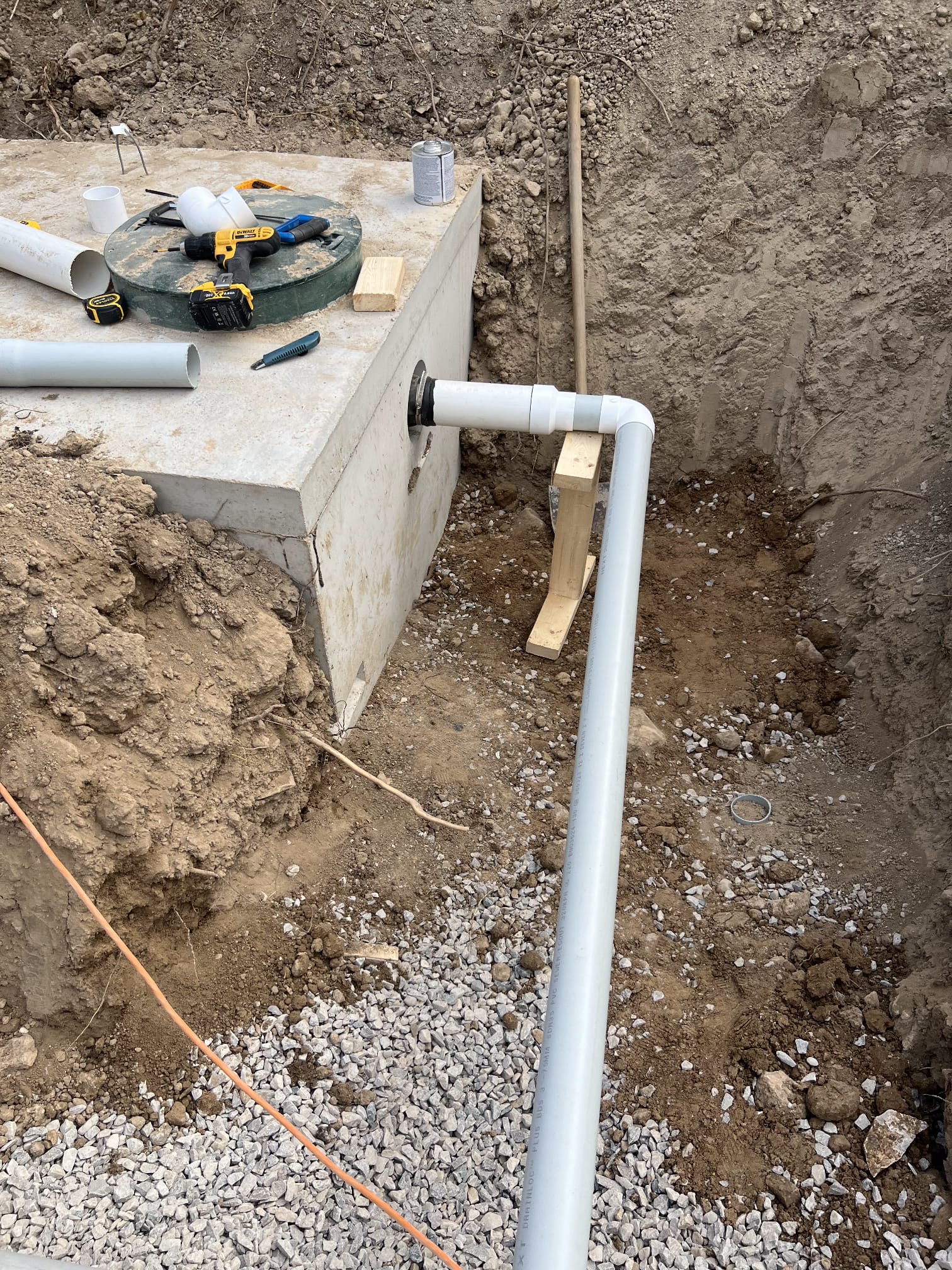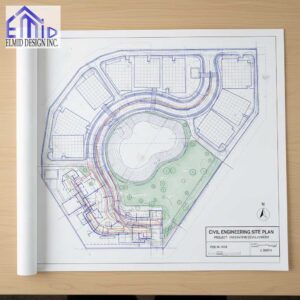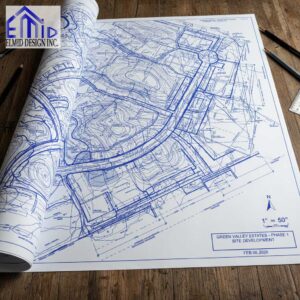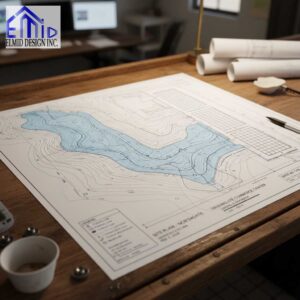A well-engineered septic design Richmond Hill system ensures safe, efficient, and environmentally responsible wastewater management. It is essential for homes and properties that are not connected to municipal sewer lines. A proper design guarantees long-term functionality, prevents contamination, and protects both soil and groundwater. In Richmond Hill, local soil conditions and strict municipal regulations make professional septic design a necessity rather than an option. Choosing licensed engineers ensures full compliance with the Ontario Building Code and long-term reliability for your system.
Key Takeaways
Septic design Richmond Hill requires expert engineering and municipal approval.
Proper design prevents contamination and ensures efficient wastewater treatment.
Licensed engineers guarantee compliance with Ontario Building Code standards.
Elmid Design Inc provides certified and reliable septic design services.
Understanding Septic Design in Richmond Hill
A septic design in Richmond Hill outlines how wastewater will be collected, treated, and safely dispersed into the ground. It includes system components such as the tank, leaching bed, and distribution piping. Engineers evaluate factors like soil type, water table, and lot grading before creating a design that meets Ontario Building Code Part 8 requirements. In Richmond Hill, where soils and terrain vary significantly, professional septic design ensures that wastewater treatment remains consistent, safe, and environmentally compliant.
Importance of Professional Engineering in Septic Design Richmond Hill
A septic system requires precise engineering to ensure proper function and long-term safety. Therefore, septic design Richmond Hill projects must be completed by licensed engineers authorized by Professional Engineers Ontario (PEO). Elmid Design Inc holds a certificate of authorization from PEO and provides expert septic system designs tailored to local site conditions. Their engineers perform detailed calculations, evaluate soil properties, and create designs that meet both regulatory and environmental standards, ensuring quality and efficiency in every project.
Site Evaluation and Soil Testing in Septic Design Richmond Hill
Site evaluation forms the foundation of every septic system design. Engineers assess the site’s slope, elevation, and soil composition to determine the best placement for the tank and leaching bed. In Richmond Hill, soils range from sandy to clay-based, requiring accurate testing to determine water absorption rates. As a result, percolation tests are performed to assess how quickly wastewater can be filtered through the ground. Proper soil testing ensures that the system is efficient, compliant, and environmentally sound.
Local Regulations for Septic Design Richmond Hill
Septic systems in Richmond Hill must comply with both municipal bylaws and the Ontario Building Code. Before construction begins, a licensed engineer must design and stamp the plan for approval. This process ensures that every system meets public health and environmental protection requirements. Richmond Hill’s Building Department reviews each design carefully to confirm compliance. Working with certified engineers such as those at Elmid Design Inc ensures that all documentation, design details, and approvals are handled accurately and efficiently.
Types of Septic Systems Used in Richmond Hill
Different types of septic systems are available to suit various soil and property conditions in Richmond Hill. Conventional gravity systems are best suited for well-draining soils, while pressure distribution and tertiary treatment systems are ideal for properties with clay or shallow soils. Engineers evaluate site conditions to determine which system will perform best over time. By combining accurate soil analysis and professional engineering, each septic design Richmond Hill project achieves the highest level of reliability and treatment efficiency.
Benefits of Professional Septic Design Richmond Hill
A professional septic design offers many advantages, including improved system lifespan, regulatory compliance, and environmental protection. When wastewater is treated effectively, it prevents contamination of groundwater and surface water. Additionally, professional design ensures lower maintenance costs and fewer system failures. Elmid Design Inc delivers customized septic design Richmond Hill solutions that meet each property’s unique needs while following strict engineering and environmental standards. A properly engineered system provides peace of mind and long-term savings for homeowners.
Common Challenges in Septic Design Richmond Hill
Septic design projects in Richmond Hill often face challenges related to terrain, soil composition, and space limitations. High water tables and clay-heavy soils can make wastewater absorption difficult. Furthermore, smaller lot sizes in residential areas require innovative solutions to maintain compliance. Professional engineers analyze each factor and create designs that address these challenges effectively. Elmid Design Inc applies technical expertise and modern engineering tools to ensure each septic design Richmond Hill system operates efficiently and remains durable over time.
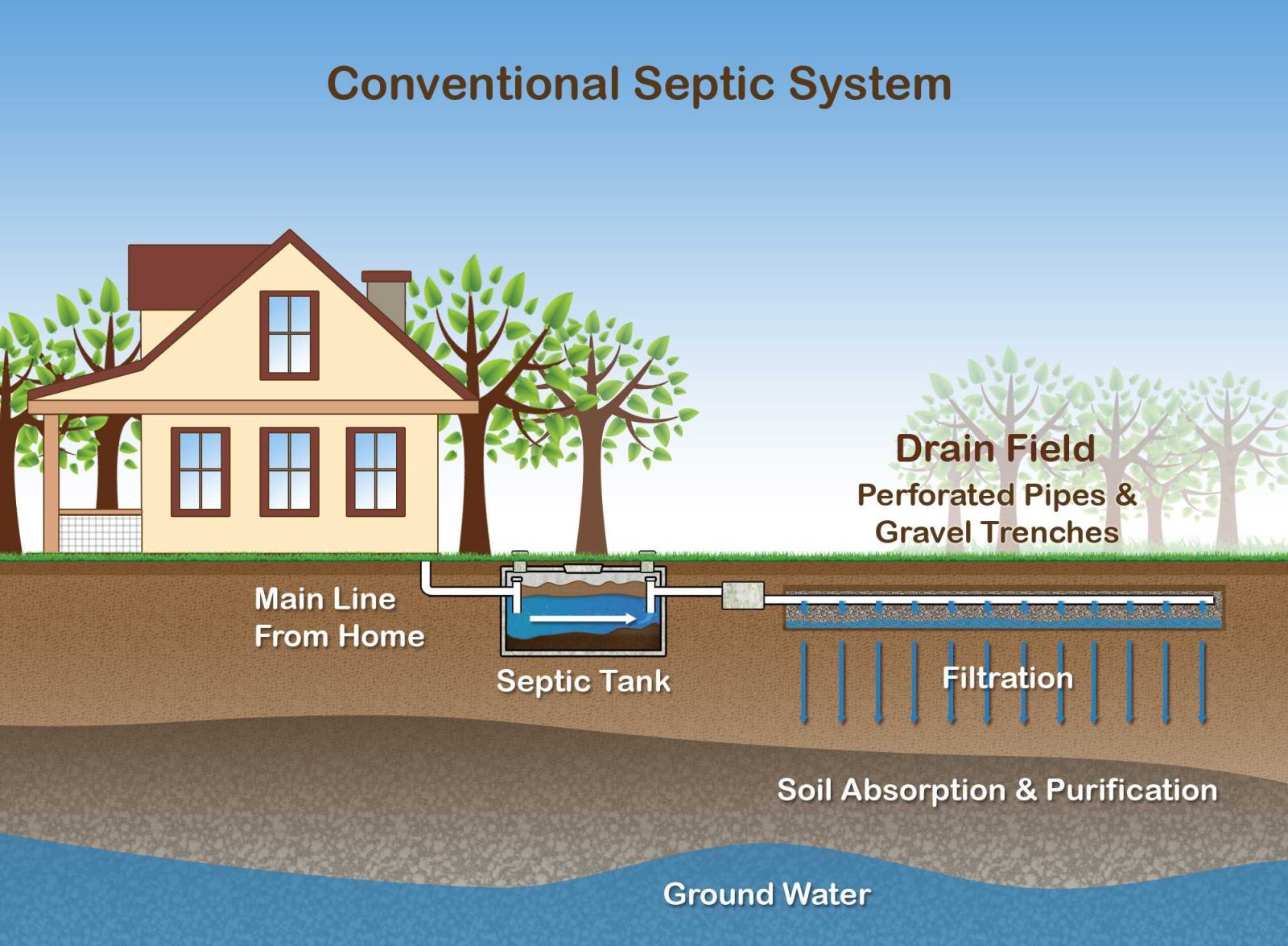
Importance of Maintenance in Septic Design Richmond Hill
Ongoing maintenance is crucial for keeping a septic system efficient and functional. Regular inspections, tank pumping, and filter cleaning help prevent costly repairs and contamination. In Richmond Hill, engineers generally recommend inspections every two to three years depending on usage. Elmid Design Inc incorporates accessible maintenance points in each design to simplify service. Additionally, proactive care ensures consistent performance, protects groundwater, and extends system lifespan. A well-maintained septic system reduces unexpected breakdowns and promotes long-term reliability.
Cost Considerations for Septic Design Richmond Hill
The cost of a septic system varies depending on soil conditions, property layout, and system type. Basic gravity systems are typically more affordable, while advanced tertiary systems require greater investment but deliver higher efficiency. Therefore, accurate site evaluation is essential for estimating costs correctly. Elmid Design Inc provides detailed cost assessments to help property owners understand expenses before construction begins. Investing in professional septic design Richmond Hill services ensures that the system meets regulations and minimizes costly modifications later.
Environmental Impact of Septic Design Richmond Hill
Septic design plays a major role in environmental protection across Richmond Hill. A properly engineered system prevents pollutants from entering groundwater, lakes, or nearby rivers. Moreover, advanced treatment systems reduce nutrient discharge, protecting natural habitats. Elmid Design Inc integrates eco-friendly materials and sustainable engineering practices into each project to minimize the environmental footprint. Consequently, every septic design Richmond Hill project not only serves the property but also contributes to the community’s environmental health and long-term sustainability.
Choosing the Right Engineer for Septic Design Richmond Hill
Selecting a qualified engineer is critical for achieving a compliant and efficient septic system. Only engineers licensed by Professional Engineers Ontario (PEO) can design systems that meet Ontario Building Code standards. Elmid Design Inc holds a certificate of authorization from PEO and has extensive experience working within Richmond Hill’s unique conditions. Their engineers manage every stage of the design process, from soil testing to final approval. Therefore, choosing a reputable firm ensures accuracy, compliance, and peace of mind for property owners.
Common Issues in Septic Systems and How to Prevent Them
Common problems such as blockages, drainage issues, and system overflows often result from poor design or irregular maintenance. To prevent these failures, engineers must perform detailed soil and flow analyses during design. Elmid Design Inc ensures each septic design Richmond Hill system has proper sizing, layout, and accessibility. In addition, homeowners should schedule regular maintenance to detect early signs of malfunction. Effective engineering combined with responsible use keeps systems operating efficiently while reducing the risk of costly repairs.
Inspections and Regulatory Approvals in Richmond Hill
Before construction, every septic design in Richmond Hill must undergo a thorough municipal review. Inspectors verify that the design aligns with Ontario Building Code Part 8 and local environmental regulations. During installation, both engineers and municipal officials perform site visits to confirm compliance. Elmid Design Inc works closely with the Richmond Hill Building Department to streamline approvals and inspections. This coordinated approach ensures the septic system functions as designed and avoids any post-installation issues or legal complications.
Future Trends in Septic Design Richmond Hill
The future of septic design in Richmond Hill is centered around sustainability, smart technology, and advanced treatment efficiency. New systems feature automated monitoring, energy-efficient pumps, and improved filtration methods. Elmid Design Inc stays ahead of these innovations by integrating advanced tools into their septic design Richmond Hill projects. As technology evolves, systems are becoming more sustainable and easier to manage. The future of septic design will focus on cleaner, smarter, and longer-lasting wastewater treatment solutions for every property.
Sustainable Practices in Septic Design Richmond Hill
Sustainability is becoming a key focus in septic design across Richmond Hill. Engineers now integrate energy-efficient pumps, environmentally friendly materials, and advanced filtration systems that improve water quality and reduce waste. Elmid Design Inc incorporates low-impact construction techniques that protect soil and groundwater during installation. Moreover, their designs minimize long-term maintenance needs and energy consumption. Sustainable septic design Richmond Hill projects not only meet regulatory standards but also support a cleaner and healthier environment for the community.
Case Study: Residential Septic Design Richmond Hill
A residential property in Richmond Hill faced challenges with limited space and poor drainage conditions. Elmid Design Inc conducted detailed soil testing and hydrological analysis to determine the best approach. The engineering team designed a compact tertiary treatment system that fit the site while maintaining optimal performance. The system received quick municipal approval and continues to operate efficiently. This case demonstrates how expert engineering and innovative design can overcome site constraints while maintaining full compliance and reliability.
Case Study: Commercial Septic Design Richmond Hill
Commercial septic systems demand robust design and high treatment capacity. One recent project involved a multi-unit commercial facility requiring a custom-engineered solution to handle increased wastewater flow. Elmid Design Inc designed a pressure distribution system with tertiary treatment, ensuring consistent effluent quality. The design passed all municipal reviews and reduced the client’s long-term maintenance costs. This example highlights how professional septic design Richmond Hill solutions meet the unique needs of commercial clients while ensuring sustainability and performance.
Role of Soil Composition in Septic Design Richmond Hill
Soil composition directly affects how efficiently a septic system treats wastewater. Sandy soils allow for faster absorption, while clay-based soils may require advanced systems to ensure proper filtration. Engineers in Richmond Hill conduct percolation and permeability tests to determine which system design suits the property best. Elmid Design Inc uses these results to tailor each septic design Richmond Hill project to the specific characteristics of the site. Understanding soil behavior ensures reliable wastewater treatment and long-lasting system performance.
Integration of Technology in Septic Design Richmond Hill
Technology continues to transform how septic systems are designed, monitored, and maintained. Engineers use advanced mapping, hydraulic modeling, and monitoring software to improve accuracy and efficiency. Elmid Design Inc integrates these digital tools into their septic design Richmond Hill services, allowing for precise calculations and faster approval times. Furthermore, smart monitoring systems are becoming common, helping property owners track performance and detect issues early. Technological integration enhances system reliability and ensures compliance with evolving environmental standards.
How Elmid Design Inc Ensures Compliance and Quality
Quality control is central to every septic design Richmond Hill project. Elmid Design Inc, authorized by Professional Engineers Ontario (PEO), follows a structured process that includes peer review, soil validation, and municipal coordination. Each design undergoes internal quality checks before submission for approval. This rigorous approach ensures accuracy, compliance, and efficiency at every stage. Moreover, ongoing communication between engineers, contractors, and inspectors helps maintain consistency from design through installation. This commitment to quality ensures lasting performance and trust.
Long-Term Value of Professional Septic Design Richmond Hill
A properly engineered septic system offers significant long-term benefits. It increases property value, reduces maintenance costs, and ensures environmental protection. Professional design also prevents system failures, which can be costly and disruptive. Elmid Design Inc creates septic design Richmond Hill solutions that combine technical precision with cost efficiency. These designs deliver durability and ease of maintenance while safeguarding the environment. A professionally designed system is an investment that protects both the property and the surrounding ecosystem for decades.
Importance of Technical Expertise in Septic Design Richmond Hill
Engineering expertise determines the success of every septic design. Licensed engineers at Elmid Design Inc possess specialized training in hydrology, soil mechanics, and wastewater management. Their technical knowledge allows them to create systems that balance performance with sustainability. Moreover, continuous professional development ensures that their team remains updated with current technologies and regulatory standards. This level of expertise guarantees that each septic design Richmond Hill project meets both technical and environmental expectations without compromise.
Contribution of Septic Design to Community Health
Effective septic design protects public health by preventing contamination of local water sources. In Richmond Hill, many properties depend on private septic systems, making proper engineering essential. Elmid Design Inc contributes to community safety through reliable and environmentally responsible septic design Richmond Hill projects. Their designs reduce risks of groundwater pollution and promote cleaner living environments. A professionally engineered system benefits not just homeowners but also the wider community by maintaining ecological balance and protecting water quality.
Long-Term Maintenance and System Care
Long-term maintenance begins with intelligent design. Engineers plan for easy access to tanks, filters, and monitoring equipment to simplify future inspections and servicing. Elmid Design Inc considers these details in every septic design Richmond Hill project to support efficient system care. Additionally, clear maintenance plans extend the lifespan of the system and prevent contamination or premature failure. Properly maintained systems protect both property value and environmental quality, ensuring reliable performance for decades after installation.
Future Innovations in Septic Design Richmond Hill
The future of septic design in Richmond Hill is shifting toward smarter, more sustainable technologies. Engineers are developing systems equipped with automated sensors, energy-efficient pumps, and data-driven monitoring capabilities. Elmid Design Inc continues to adopt these innovations to provide clients with efficient and environmentally friendly solutions. As technology advances, septic design Richmond Hill will focus on reducing maintenance needs and extending system life. The evolution of design ensures cleaner water management and greater environmental protection across the region.
Final Thoughts on Septic Design Richmond Hill
A well-engineered septic system is a long-term investment in safety, efficiency, and environmental responsibility. Every project requires a combination of expertise, precision, and local knowledge to achieve the best results. In Richmond Hill, Elmid Design Inc remains a trusted leader, offering certified and innovative septic design services. Their focus on engineering excellence, sustainability, and regulatory compliance ensures dependable systems built for the future. With professional septic design Richmond Hill solutions, property owners gain reliability, efficiency, and complete peace of mind.
FAQs About Septic Design Richmond Hill
How long does the septic design process take in Richmond Hill?
The process usually takes between two and four weeks depending on the site’s complexity, soil conditions, and municipal review timeline. Elmid Design Inc expedites approvals by ensuring all documentation and designs meet requirements.
How often should a septic system be pumped in Richmond Hill?
Most septic systems require pumping every three to five years, depending on water usage and tank size. Regular maintenance helps prevent blockages and system failure.
Can homeowners design their own septic systems?
No, in Richmond Hill only licensed engineers can design septic systems. This rule ensures safety, accuracy, and compliance with provincial regulations.
What factors affect septic system costs?
Costs depend on soil type, lot slope, and system type. Advanced systems with tertiary treatment tend to cost more but provide superior performance and environmental protection.
What happens if a septic system fails inspection?
If a system fails inspection, it must be redesigned or upgraded to meet standards. Working with certified engineers such as those from Elmid Design Inc prevents this issue by ensuring compliance from the beginning.

Trusted Engineering Professionals for Septic Design Richmond Hill
Elmid Design Inc is a licensed engineering firm with a certificate of authorization from Professional Engineers Ontario (PEO), specializing in precise and compliant septic design Richmond Hill solutions. The company’s team of experienced engineers combines advanced technology, local expertise, and sustainable design practices to deliver efficient and long-lasting systems. With a commitment to accuracy, safety, and environmental responsibility, Elmid Design Inc ensures every project meets Ontario Building Code standards and client expectations, making it a trusted choice for septic system engineering across Richmond Hill and nearby communities.
Geographic Locations That We Service:
Our Licensed Professional Engineers specializing in Engineered Site Grading Plans offer the best-engineered site grading plan, lot grading and erosion plan, and drainage plan to obtain site plan approval and building permits in Ontario, including a wide range of municipalities. Each area boasts unique features and requirements, making our tailored approach essential for success.
Toronto and Surrounding Areas
In the vibrant heart of Ontario, we service Toronto (City of Toronto) and surrounding areas. Additionally, we cover Oshawa (City of Oshawa), Pickering (City of Pickering), and Clarington (Municipality of Clarington). Furthermore, our expertise extends to Ajax (Town of Ajax), Whitby (Town of Whitby), Brock (Township of Brock), Scugog (Township of Scugog and Uxbridge (Township of Uxbridge).
Halton Region
Moving to the Halton Region, our services encompass Burlington (City of Burlington) and Halton Hills (Town of Halton Hills). Also included are Milton (Town of Milton) and Oakville (Town of Oakville).
Peel Region
In the Peel Region, we provide services in Brampton (City of Brampton), Mississauga (City of Mississauga), and Caledon (Town of Caledon).
York Region
Our services in the York Region cover Vaughan (City of Vaughan), Aurora (Town of Aurora), and East Gwillimbury (Town of East Gwillimbury). We also cater to Georgina (Town of Georgina), Markham (City of Markham), Newmarket (Town of Newmarket), Richmond Hill (City of Richmond Hill), Whitchurch-Stouffville (Town of Whitchurch-Stouffville), King (Township of King), and Bradford-West Gwillimbury (Town of Bradford-West Gwillimbury). Each municipality here offers a distinct setting, requiring our specialized approach.
Other Southern Ontario Cities and Towns
We also serve many other cities and towns in Southern Ontario. These include Hamilton (City of Hamilton), St. Catharines (City of St. Catharines), Niagara on the Lake (Town of Niagara on the Lake), Brant (County of Brant), Cambridge (City of Cambridge), Kitchener (City of Kitchener), Waterloo (City of Waterloo), and Woodstock (City of Woodstock). Furthermore, we operate in Guelph (City of Guelph), Centre Wellington (Township of Centre Wellington), Shelburne (Town of Shelburne), Orangeville (Town of Orangeville), New Tecumseth (Town of New Tecumseth), Essa (Town of Essa), Collingwood (Town of Collingwood), Wasaga Beach (Town of Wasaga Beach), Barrie (City of Barrie), Midland (Town of Midland), Orillia (City of Orillia), Ramara (Town of Ramara), Minden Hills (Town of Minden Hills), North Kawartha (Town of North Kawartha), Kawartha Lakes (City of Kawartha Lakes), Peterborough (City of Peterborough), Selwyn (Town of Selwyn), and Brighton (Municipality of Brighton).

